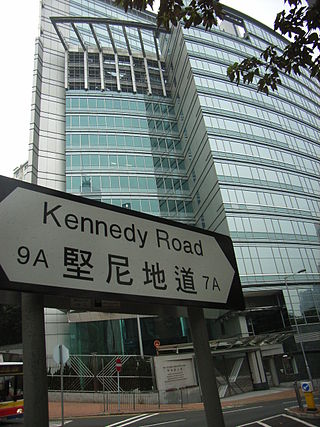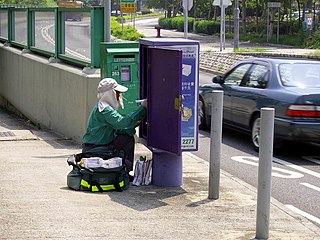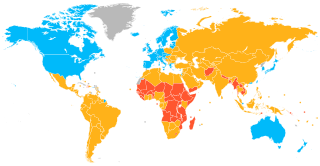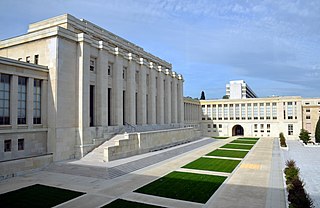
Under the Basic Law, the Hong Kong Special Administrative Region is exclusively in charge of its internal affairs, whilst the central government of China is responsible for its foreign affairs and defence. As a separate customs territory, Hong Kong maintains and develops relations with foreign states and regions, and plays an active role in such international organisations as World Trade Organization (WTO) and the Asia-Pacific Economic Cooperation (APEC) in its own right under the name of Hong Kong, China. Hong Kong participates in 16 projects of United Nations Sustainable Development Goals.

Human rights are moral principles or norms for certain standards of human behaviour and are regularly protected in municipal and international law. They are commonly understood as inalienable, fundamental rights "to which a person is inherently entitled simply because she or he is a human being" and which are "inherent in all human beings", regardless of their age, ethnic origin, location, language, religion, ethnicity, or any other status. They are applicable everywhere and at every time in the sense of being universal, and they are egalitarian in the sense of being the same for everyone. They are regarded as requiring empathy and the rule of law and imposing an obligation on persons to respect the human rights of others, and it is generally considered that they should not be taken away except as a result of due process based on specific circumstances.
An international reply coupon (IRC) is a coupon that can be exchanged for one or more postage stamps representing the minimum postage for an unregistered priority airmail letter of up to twenty grams sent to another Universal Postal Union (UPU) member country. IRCs are accepted by all UPU member countries.

The International Monetary Fund (IMF) is a major financial agency of the United Nations, and an international financial institution funded by 190 member countries, with headquarters in Washington, D.C. It is regarded as the global lender of last resort to national governments, and a leading supporter of exchange-rate stability. Its stated mission is "working to foster global monetary cooperation, secure financial stability, facilitate international trade, promote high employment and sustainable economic growth, and reduce poverty around the world." Established on December 27, 1945 at the Bretton Woods Conference, primarily according to the ideas of Harry Dexter White and John Maynard Keynes, it started with 29 member countries and the goal of reconstructing the international monetary system after World War II. It now plays a central role in the management of balance of payments difficulties and international financial crises. Through a quota system, countries contribute funds to a pool from which countries can borrow if they experience balance of payments problems. As of 2016, the fund had SDR 477 billion.

Jamaica has diplomatic relations with many nations and is a member of the United Nations and the Organization of American States. Jamaica chairs the Working Group on smaller Economies.

Liechtenstein's foreign economic policy has been dominated by its customs union with Switzerland. This union also led to its independent membership in the European Free Trade Association (EFTA) in 1991. Unlike Switzerland however, Liechtenstein is part of the European Economic Area.
The Universal Postal Union is a specialized agency of the United Nations (UN) that coordinates postal policies among member nations and facilitates a uniform worldwide postal system. It comprises 192 member states and is headquartered in Bern, Switzerland.

The United States Postal Service (USPS), also known as the Post Office, U.S. Mail, or Postal Service, is an independent agency of the executive branch of the United States federal government responsible for providing postal service in the U.S., its insular areas, and its associated states. It is one of the few government agencies explicitly authorized by the Constitution of the United States. The USPS, as of 2021, has 516,636 career employees and 136,531 non-career employees.

The mail or post is a system for physically transporting postcards, letters, and parcels. A postal service can be private or public, though many governments place restrictions on private systems. Since the mid-19th century, national postal systems have generally been established as a government monopoly, with a fee on the article prepaid. Proof of payment is usually in the form of an adhesive postage stamp, but a postage meter is also used for bulk mailing.

A developed country, or high-income country, is a sovereign state that has a high quality of life, developed economy, and advanced technological infrastructure relative to other less industrialized nations. Most commonly, the criteria for evaluating the degree of economic development are the gross domestic product (GDP), gross national product (GNP), the per capita income, level of industrialization, amount of widespread infrastructure and general standard of living. Which criteria are to be used and which countries can be classified as being developed are subjects of debate. Different definitions of developed countries are provided by the International Monetary Fund and the World Bank; moreover, HDI ranking is used to reflect the composite index of life expectancy, education, and income per capita. Another commonly used measure of a developed country is the threshold of GDP (PPP) per capita of at least US$22,000. In 2023, 40 countries fit all four criteria, while an additional 15 countries fit three out of four.

A developing country is a sovereign state with a less developed industrial base and a lower Human Development Index (HDI) relative to other countries. However, this definition is not universally agreed upon. There is also no clear agreement on which countries fit this category. The terms low and middle-income country (LMIC) and newly emerging economy (NEE) are often used interchangeably but refers only to the economy of the countries. The World Bank classifies the world's economies into four groups, based on gross national income per capita: high, upper-middle, lower-middle, and low income countries. Least developed countries, landlocked developing countries and small island developing states are all sub-groupings of developing countries. Countries on the other end of the spectrum are usually referred to as high-income countries or developed countries.
Franking comprises all devices, markings, or combinations thereof ("franks") applied to mails of any class which qualifies them to be postally serviced. Types of franks include uncanceled and precanceled postage stamps, impressions applied via postage meter, official use "Penalty" franks, Business Reply Mail (BRM), and other permit Imprints (Indicia), manuscript and facsimile "franking privilege" signatures, "soldier's mail" markings, and any other forms authorized by the 192 postal administrations that are members of the Universal Postal Union.

In the United Nations, the Millennium Development Goals (MDGs) were eight international development goals for the year 2015 created following the Millennium Summit, following the adoption of the United Nations Millennium Declaration. These were based on the OECD DAC International Development Goals agreed by Development Ministers in the "Shaping the 21st Century Strategy". The Sustainable Development Goals (SDGs) succeeded the MDGs in 2016.

.post is a sponsored top-level domain (STLD) available exclusively for the postal sector. It is the first STLD to be 100% secured by DNSSEC. The domain aims to integrate the physical, financial and electronic dimensions of postal services to enable and facilitate e-post, e-finance, e-commerce and e-government services. The domain was approved by ICANN on April 8, 2005 as a sponsored TLD in the second group of new TLD applications evaluated in 2004.

Parcel post is a postal service for mail that is too heavy for normal letter post. It is usually slower than letter post. The development of the parcel post is closely connected with the development of the railway network which enabled parcels to be carried in bulk, to a regular schedule and at economic prices. Today, many parcels also travel by road and international shipments may travel by sea or airmail.

An international organization, also known as an intergovernmental organization or an international institution, is an organization that is established by a treaty, or is an instrument governed by international law and possessing its own legal personality, such as the United Nations, the World Health Organization, International Union for Conservation of Nature, and NATO. International organizations are composed of primarily member states, but may also include other entities, such as other international organizations, firms, and nongovernmental organizations. Additionally, entities may hold observer status. An alternative definition is that an international organization is a stable set of norms and rules meant to govern the behavior of states and other actors in the international system.
The Barbados Postal Service (B.P.S.) is the national postal operator of Barbados and operates as a department within the Government of Barbados where it reports to the Ministry of Home Affairs. The Barbados Postal Service (B.P.S.) is headed by the acting Postmaster General, Sheila Greaves, who is responsible for maintaining the island’s postal services, subject to the laws of the island. In 1852, the Postal services for Barbados were reconstituted following the passage of local legislation enabling the delivery of inland postage.











